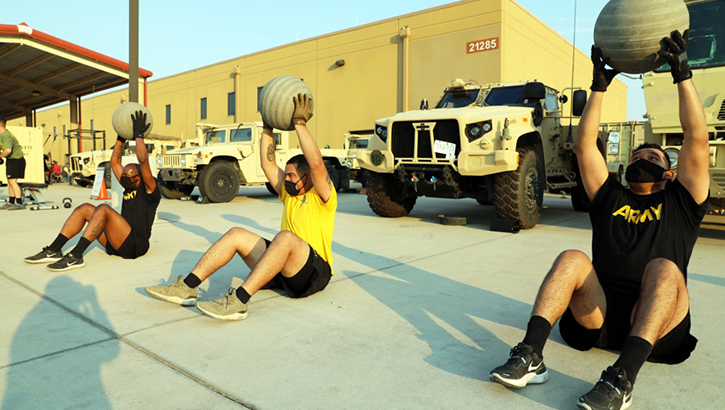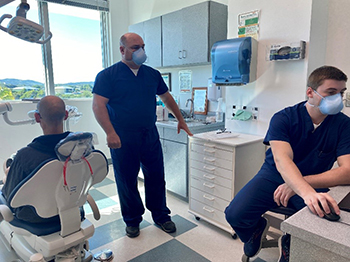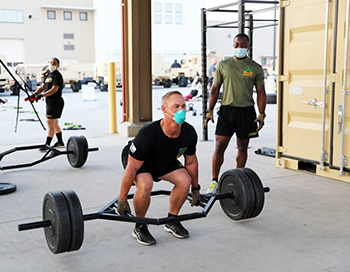A ‘holistic framework’ for Total Force Fitness through 2021
 1st Armored Division Soldiers from the 4th Battalion, 70th Armor Regiment, 1st Brigade Combat Team perform medicine ball sit-ups during an early morning Holistic Health and Fitness (H2F) physical training session at Fort Bliss, Texas last August. As the nation slowly re-opened, soldiers were resuming battle rhythms while continuing to adhere to strict COVID-19 safety precautions, which can make training for combat-ready fitness and performance levels especially challenging. (U.S. Army photo by Jean Han)
1st Armored Division Soldiers from the 4th Battalion, 70th Armor Regiment, 1st Brigade Combat Team perform medicine ball sit-ups during an early morning Holistic Health and Fitness (H2F) physical training session at Fort Bliss, Texas last August. As the nation slowly re-opened, soldiers were resuming battle rhythms while continuing to adhere to strict COVID-19 safety precautions, which can make training for combat-ready fitness and performance levels especially challenging. (U.S. Army photo by Jean Han)
If ever a New Year’s Day brought a need for the reset button, it was January 1, 2021. Last year was wrought with a fatal and global pandemic, financial chaos, political bedlam, and wide social upheaval.
Maintaining physical, mental, and spiritual health over the past year has been just as much of a challenge for our Service members as it has for the population as a whole, according to numerous experts.
So, it makes sense that from a military standpoint, the concept of Total Force Fitness (TFF) has been in need of a re-introduction as we sail into February, with the promises of new COVID-19 vaccines and the peril of new strains of the virus. The TFF concept reconsiders what it means to be healthy beyond the typical focus on physical fitness and nutrition. It looks at the “whole self” and the aspects of overall health key to performance and battle-readiness.
“I think 2021 is, for us, hope, and hoping that TFF will really re-emerge as a very important part of the Department of Defense,” said Dr. Patricia Deuster, professor and director for the Consortium for Health and Military Performance (CHAMP) at the Uniformed Services University in Bethesda, Maryland. “All of the services are buying into it in their own way.”
The Army, for instance, introduced a program called “Holistic Health and Fitness,” (H2F) in October. “Changes in the strategic and operational environments are outpacing our current processes for physical and non-physical performance training,” the Army’s guide to the program says. “In order to maintain our military strength and accomplish our mission, we must significantly increase our investment in how we understand, assess, and improve the holistic health and fitness of all of our Soldiers in the Total Army.”
With unpredictable challenges to American interests, the guide says, the Army must maintain an improved adaptive posture, requiring a cultural shift in the way soldiers are trained, developed, and cared for.
 Navy Cmdr. (Dr.) David “Scotty” Weldon (center) and Hospital Corpsman Correy Washburn (right) review a deployed Marine’s dental records in preparation for his first exam since last year at Naval Station Guantanamo Bay, Cuba. (U.S. Navy photo by Dawn Grimes)
Navy Cmdr. (Dr.) David “Scotty” Weldon (center) and Hospital Corpsman Correy Washburn (right) review a deployed Marine’s dental records in preparation for his first exam since last year at Naval Station Guantanamo Bay, Cuba. (U.S. Navy photo by Dawn Grimes)
Likewise, TFF is a holistic framework for understanding, assessing, and maintaining the capabilities of the Armed Forces to execute the full range of military operations. Achieving and sustaining fitness and performance of units, organizations, families, and communities of military members through that framework is a key enabler of the 2018 National Defense Strategy’s first line of effort: “Build a More Lethal Force.”
“I think that 2020 has re-enforced the importance TFF,” Deuster said. “You have to have that holistic perspective to be able to survive and be resilient. If you lack any piece of it, you’re not going to be performing the way you want to.”
TFF consists of eight domains to keep service members flourishing in an environment of sustained deployment and combat operations. The domains are derived from sources including current practices on medical fitness, and integrative health care approaches used by the individual services and the National Guard. TFF looks to extend beyond the soldier, sailor, airman or Marine to strengthen resilience in families, communities, and organizations, recognizing that these are critical to supporting overall resilience.
The eight domains of TFF are: physical; environmental (performing in any situation); medical and dental prevention; nutritional; ideological and spiritual (strengthening connectedness with meaning and purpose); social (productive personal and professional relationships); psychological, and financial.
Sometimes tailoring different aspects of the eight domains to the duty station environment is key to good results. You’d be hard-pressed to find a more unique place to be stationed than ‘Gitmo’ — that is, Naval Station Guantanamo Bay, Cuba. Maintaining TFF during a pandemic can be challenging, so keeping one’s focus on the basics is sometimes the key, says Dawn Grimes, public affairs officer for Gitmo’s Navy Medicine Readiness and Training Command. Recent examples of TFF at Gitmo run the gamut from straight-up physical fitness challenges, to cleaning up the beach for ideological and spiritual reasons, to Saturday hours in the dental clinic.
Navy Hospital Corpsman Senior Chief Kevin Miller at Naval Hospital Guantanamo Bay said he leads a variety of fitness activities like his “Run with the Senior Chief” outings “to improve unit integrity and enhance pride and belonging among junior sailors. We needed to reestablish cardio output goals during COVID-19 mandates, to ensure our sailors were remaining healthy even when the gym was closed or running on limited hours.”
 A 1st Armored Division soldier from the 4th Battalion, 70th Armor Regiment, 1st Brigade Combat Team performs a trap bar deadlift during an early morning Holistic Health and Fitness (H2F) physical training session at Fort Bliss, Texas last August. (U.S. Army photo by Jean Han)
A 1st Armored Division soldier from the 4th Battalion, 70th Armor Regiment, 1st Brigade Combat Team performs a trap bar deadlift during an early morning Holistic Health and Fitness (H2F) physical training session at Fort Bliss, Texas last August. (U.S. Army photo by Jean Han)
Miller also challenges sailors every week to a plank challenge in the naval hospital’s parking lot. “Sailors should be continually challenged physically and mentally in order to maximize their potential,” he said.
“Mental readiness includes three interrelated capabilities — cognitive, emotional, and interpersonal,” the Army’s Health and Fitness (H2F) manual reads. “Just as physical readiness requires training and integration of a variety of components (for example, muscular endurance, muscular strength, balance, flexibility, and agility), optimizing mental readiness requires the training and integration of a variety of capabilities.”
At Gitmo, sailors also get together weekly for something less physically demanding but just as uplifting. They clean up litter and debris from the Guantanamo Bay shoreline, and Grimes said that over the past year their efforts have positively affected marine life and greatly decreased the chances of injury from discarded trash.
“There were times when only a handful would show up, then people would see what we were doing and would join in,” said Navy Hospital Corpsman Second Class Nathaniel Collin, who helped organize many of the clean-ups and has watched as people from other commands joined in. “The beach is covered with trash and syringes and plastic, and when we finish you can really feel proud you’ve made a difference, leaving a place better than you found it while representing your command and organization. It’s really rewarding.”
It was rewarding for the Gitmo dental facility this past December, too, when more than 150 Marines were treated over two Saturdays to get caught up on their annual exams. COVID-19 closings delayed some Marines getting care, causing a gap of almost two years for some.
“When there is a small problem with a tooth, it may turn into a big problem in 12 to 18 months,” said Navy Cmdr. (Dr.) David “Scotty” Weldon, a dentist who also cooked breakfast burritos and hash for his clinicians pulling weekend duty. “Cavities and oral cancer do not wait.”
Deuster would not be surprised to hear how enthusiastic the sailors at Gitmo are about TFF activities that seem, on their face, as simply doing the right thing. But in times like these, conscious efforts to improve ourselves and our communities are right in line with what is needed, daily.
“I think 2021 is also a year of uncertainty ... we still have to really try what we call hope,” she said. “Hope for CHAMP means honesty, optimism, professionalism, and empathy. TFF is all about that holistic framework for how we take care of ourselves, others, our community, and the enterprise.”
Our current environment is a chance for some inward reflection, Deuster said, and to look outward to see what others are in need of.
“Total Force Fitness is not medical, because we’re not being reactive,” Deuster said. “If you look at it, medical is being more reactive — you’re treating something that is a problem. Total Force Fitness is proactive, and so I see it really as ownership within the [DOD]. Medical is the support agency. Total Force Fitness is owned by the line. This is the framework for taking care of the department’s most precious resource: its people.”